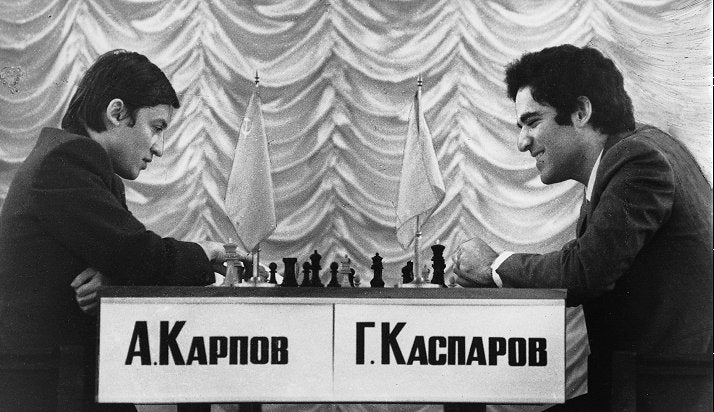Discovering Grandmasters - Who Is Garry Kasparov


Basics Information On Garry Kasparov
Known as: Garry Kasparov
Born: April 13, 1963
Born in: Baku, Azerbaijan, U.S.S.R.
Full given name: Garri Kimovich Kasparov
Full birth name: Garik Kimovich Weinstein
Quick Intro Into Knowing The Legend
Garry Kasparov became the under-18 chess champion of the USSR at the age of 12 and the world under-20 champion at 17.
Soviet-born chess master who became the world chess champion in 1985.
Kasparov was the youngest world chess champion (at 22 years of age) and the first world chess champion to be defeated by a supercomputer in a competitive match.
He defended his title five times, including a legendary series of matches against arch-rival Anatoly Karpov.
Kasparov broke Bobby Fischer’s rating record in 1990 and his own peak rating record remained unbroken until 2013.
Starting Points For Kasparov
Kasparov was born to a Jewish father and an Armenian mother. He began playing chess at age 6, by age 13 was the Soviet youth champion, and won his first international tournament at age 16 in 1979. Kasparov became an international grandmaster in 1980.
From 1973 to 1978 he studied under former world champion Mikhail Botvinnik. Kasparov has described himself as a "self-appointed Christian", although "very indifferent" and identifies as Russian: "Although I'm half-Armenian, half-Jewish, I consider myself Russian because Russian is my native tongue, and I grew up with Russian culture."
Kasparov began the serious study of chess after he came across a chess problem set up by his parents and proposed a solution. When Garry was seven years old, his father died of leukemia. At the age of twelve, Garry, upon request of his mother Klara and with the consent of the family, adopted Klara's surname Kasparov, which was done to avoid possible anti-Semitic tensions, which were common in the USSR at the time.

Garry Kasparov and Mikhail Botvinnik, Moscow, 1986
The Anatoly Karpov Match
Karpov entered the World Chess Championship match at a FIDE rating of 2720 with Kasparov not far behind at 2700, with the final match of the championship, match 24, a must-win for Karpov to retain his world title which he had held from 1975 onwards.
Often called by Kasparov as the ‘game of his life’, the young Russian turned the game on its head with a far-sighted rook play on his 23rd move. This eventually led to decisive errors from Karpov on move 36 and move 40, leading to his loss after 42 moves. As a result, Kasparov became the thirteenth and youngest world champion aged 22, a title he held till 1993.

Anatoly Karpov and Garry Kasparov, World Championship 1985
DeepBlue vs. Garry Kasparov
The 1997 six-game chess match between world chess champion Garry Kasparov and IBM’s supercomputer Deep Blue was a rematch after the machine’s defeat in Philadelphia in 1996. The match was a historic moment in chess, as it was the first time that a computer defeated a reigning world chess champion. The victory was seen as a sign of how far artificial intelligence had come and how it was catching up with the intellectual capabilities of human intelligence. The 19-move game also inspired the 1997 documentary titled ‘The Man v The Machine’ and revealed the additional pressure for a player when playing against an unyielding machine.

Garry Kasparov vs. DeepBlue, 1997
The Fascinating Journey of Garry Kasparov Continues
In 1993 Kasparov and the English grandmaster Nigel Short left FIDE and formed a rival organization, the Professional Chess Association (PCA). In response, FIDE stripped the title of world champion from Kasparov, who defeated Short that same year to become the PCA world champion. In 1995 he successfully defended his PCA title against Viswanathan Anand of India; the PCA disbanded in 1996.
Kasparov retired from competitive chess in 2005, though not from involvement in chess. In particular, he produced an acclaimed series of books, Kasparov on My Great Predecessors (2003–06), that covered all the world chess champions from Wilhelm Steinitz through Karpov, as well as many other great players.
In Deep Thinking: Where Machine Intelligence Ends and Human Creativity Begins (2017), Kasparov offered details of his 1997 match with Deep Blue while praising technological progress. Following his retirement, Kasparov continued to participate in exhibition matches and to coach other players still active in competitive chess.
Kasparov also remained in the public eye with his decision in 2005 to start a political organization, the United Civil Front, to oppose Russian president Vladimir Putin. In 2006 Kasparov was one of the prime movers behind a broad coalition of political parties that formed the Other Russia, a group held together by only one goal: ousting Putin from power.
Kasparov has been a contributing editor to The Wall Street Journal since 1991 and is a regular commentator on politics and human rights. He speaks frequently to business and political audiences around the world on technology, strategy, politics, and achieving peak mental performance.
He is a Senior Visiting Fellow at the Oxford-Martin School with a focus on human-machine collaboration. He’s a member of the executive advisory board of the Foundation for Responsible Robotics and a Security Ambassador for Avast Software, where he discusses cyber security and the digital future.
Kasparov’s book How Life Imitates Chess on strategy and decision-making is available in over 20 languages. He is the author of two acclaimed series of chess books, My Great Predecessors and Modern Chess.
Find Out More!
Game Over: Kasparov and the Machine is a 2003 documentary film by Vikram Jayanti about the match between Garry Kasparov, the highest rated chess player in history (at the time), the World Champion for 15 years (1985–2000) and an anti-communist politician, and Deep Blue, a chess-playing computer created by IBM.
It was coproduced by Alliance Atlantis and the National Film Board of Canada. The Rematch was won by the machine. From this experience, particularly the second game of the match, Kasparov accused the IBM team of cheating. He suspected that a human player was used during the games to improve the strategic strength of the computer.
As a metaphor for this suspicion, the film weaves in the story of the Turk, a hoax involving a chess-playing automaton built in the eighteenth century, but secretly operated by human beings. The film also implies that Deep Blue's heavily promoted victory was a plot by IBM to boost the company's market value.

Play chess on Chess Universe today!



